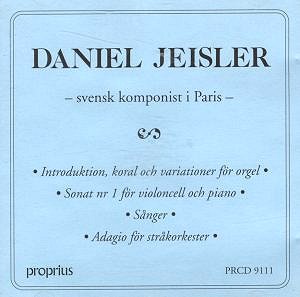Jeisler was born in Sweden in the town of Klockrike.
From 1906 he spent his life in Paris as the organist of the Swedish
Church there. His music now resides at the Royal Library in Stockholm.
The scores include four symphonies (played by the Concerts Colonne
and the Concerts Pasdeloups), nine string quartets, six violin
sonatas, two cello sonatas, five piano trios and much else. In
Paris he married the cellist Marguerite Caponsacchi. He was a
friend of Saint-Saëns and accompanist to Ninon Vallin, Casals
and Thibaud.
On this showing his earlier music took its imprint
from his Franckian contemporaries but developed a overwhelming
and very different power in the Adagio for strings. The
sonata and the organ work are suave, undulatingly romantic, pleasingly
constructed, not much given to melodramatics but neither are they
short on emotional drive - listen to the Franckian melos of the
allegro molto e con brio finale of the sonata. There are
no Gothic squalls in the organ piece. Jeisler is much more at
home with adagio-lento than with scherzo and
brio. There is a cool jazzy air to the scherzo of the sonata
but a soul is laid bare in the wonderfully slow swung adagio which
catches the murmur of steadily tolled bells. Can this be an emotional
after-wash of bereavement from the Great War? It sounds consistent.
The songs vary in their compass from the Grieg-Schumann ballad
of Under rönn och syren to the arpeggiated enchantment
of Par ce soir pluvieux to the Fauré-inflected Les
Barques to the Poulencian Rafales d'automne and
L'Ile de la mort. We are not told the date of the Adagio
but it is a work with more harmonic complexity than any of the
other pieces here. Its sombre mood sounds almost morose rising
from a brooding pavane to a resonant piercing climactic intensity
in which Jeisler seems to call out in angry protest. I would have
guessed a date some time during the Nazi occupation or possibly
just after the liberation.
The notes are in Swedish and French only - each
language allocated to a separate booklet.
Rob Barnett
